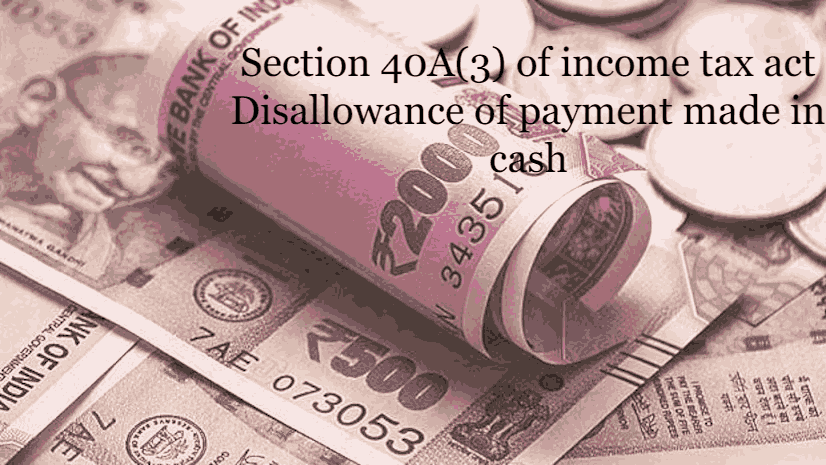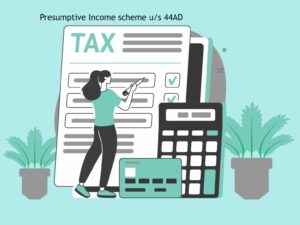Section 40A(3) of income tax act state amount not deductible in respect of expenditure exceeding Rs. 10,000.
What is section 40A(3) of income tax act?
It means if assessee incurs any expenditure in respect of which payment in excess of of Rs. 10,000 is made otherwise than by account payee cheque or account payee bank draft , 100% of such expenditure will not be allowed as deduction.
In brief , the provision of this section disallows an individual or an entity to claim cash payments in exceeding Rs. 10,000 in a day as deduction. This means it will not considered as expenses. And the same amount will be added back to the income.
However , there are some cases or circumstances under which payment is made otherwise than by account payee cheque is allowed as deduction as per rule 6DD.
What are the modes of payment allowed under section 40A (3) of income tax act?
An assessee incur any expenditure in excess of Rs. 10,000 is allow as deduction if payment is made through following modes.
- Account payee cheque
2. Demand draft
3. ECS (electronic clearing system through bank account)
4. or through prescribed electronics mode etc.
However, as per rule 6ABBA prescribed electronics modes are as follows:
- Credit Card
- Debit Card
- Net Banking
- IMPS (Immediate Payment service)
- UPI (Unified Payment Interface)
- RTGS (Real Time Gross Settlement)
- NEFT (National Electronic Fund Transfer)
- And, BHIM (Bharat Interface for Money) Aadhar Pay .
Example of section 40A (3) of income tax act
M/s DEF made payment for purchase of goods Rs. 17,000 through bearer cheque on 6th july 2023.
In case the total amount paid to a person in a day exceeds Rs.10,000 and the payment is made by way of bearer cheque or cash. This expenditure will be disallowed under section 40A(3) of the Income Tax Act and no deduction will be allowed for such payment to M/s DEF.
What are the exception to section 40A (3) ?
Exception to section 40A(3) is prescribed under rule 6DD of income tax rules. Rule 6DD species that even if payment is made in excess of Rs. 10,0000 through otherwise than by account payee cheque (i.e. cash , through bearer cheque ) is allowed as deduction.
In the following circumstances payment is made in excess of Rs. 10,000 in cash or through bearer cheque is allowed as deduction:
- Payment is made to Banking or other credit Institutions such as RBI, Commercial banks in public or private sectors , co-operative banks,land mortgage bank, primary credit/agriculture credit societies, or Life Insurance Corporation of India.
- Payment made to Government (both Central or state Government) such as payment of direct tax, GST, custom duty, excise,railway freight, sales tax etc.It covers any payment to government. For instance scrap is purchased from Indian Railways in cash.
- Payment through banking system such as letter of credit, mail, telegraphic transfer,bill of exchange payable to bank, use of ECS, credit/debit card etc.
- Payment made by book adjustment by an assessee in account of payee against money due to the assessee for any goods supplies or services rendered by him to the payee.
- Payment to cultivator , grower, or producer in respect of purchase of agricultural or forest produce or product of animal husbandry ( including livestock,meat,skins and hides), dairy product, poltry farming , fish or fishery product of horticulture or agriculture.
- Payment made to producer in respect of purchase of products manufactured or processed without the aid of power in cottage industry.
- Payment made to person who ordinarily resides or carries on business in a village not served by any bank.
Other payment made in excess of Rs. 10,000 is allowed as deduction:
- Payment of terminal benefits such as gratuity, retrenchment, compensation etc. payable to an employee or his legal heirs and if such sum does not exceed Rs. 50,000 in aggregate.
- Payment made by an assessee by way of salary to his employee after deducting TDS from salary in accordance with the provisions of section 192 and when such employee- a) is temporarily posted for continuous period of 15 days or more in a place other than his normal place of duty or on a ship; and b) does not maintain any account in any bank at such place or ship.
- Payment made by any person to his agent who is required to make cash payments for goods or services on behalf of such person
- Payment made by authorised dealer or money changer against purchase of foreign currency or travellers cheque in normal course of business.
- Payment required to be made on days when banks were closed due to holiday or strike.
What if deduction is claimed on due basis and payment is made in current year?
A special provision has been made in respect of those cases where deduction was claim earlier on due basis.The provisions are given below:
- The taxpayer had claimed a deduction in respect of an expenditure in any of the earlier year.
- The amount of deduction exceeded Rs. 10,000
- In current year payment ia made i.r.o. the aforesaid liability
- The payment exceed Rs. 10,000
- The payment is made otherwise than by account payee cheque or draft.
If above conditions are satisfies , the payments so made shall be deem to be the business income of the taxpayer of the previous year in which the payment is made.



